Pete Sutton's Blog, page 22
October 5, 2016
Guest Post - Claire Fitzpatrick
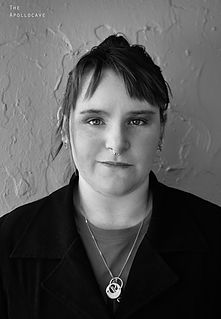
Claire Fitzpatrick is an Australian journalist, author, poet, and performance artist. She writes historical fiction, speculative fiction, and horror. Currentlystudying a bachelor of Government and International Relations, she juggles her time between parenting, interviewing people, writing assignments, andspends way too much time watching My Little Pony.
Claire dropped by BRSBKBLOG to talk about her new venture - Oscillate Wildly Press
Pete asked me to write something short about my new publishing venture, Oscillate Wildly Press, for his blog. While I’d rather laugh at someone falling over in the street, I’m deeply humbled Pete thought my press was interesting enough to share with others.
Oscillate Wildly Press (OWP) is something I’ve had on my mind for a long time. I’m a journalist and in my final year of university. I’ve been at uni for five years (I studied a Bachelor of Business for three years before changing to a Bachelor of Government and International Relations, because obviously I’m an idiot) and while I write for several magazines, edit my own film magazine, and am a published poet and horror/sci-fi author, OWP was something I continued to put off because I thought I wasn’t talented, experienced, or knowledgeable enough. However, it’s always handy to have friends in the industry! So I rounded up a few talented people who do have experience in publishing, and I pitched the idea. Surprisingly, people thought it was a great idea.
I’m somewhat egotistical and over-ambitious, so there was never a time where I doubted my ability to start a small press, however I was afraid of the backlash and hurdles I might face. I’m a firm believer in being the best possible version of yourself you can be, even if that means putting yourself out on the edge of a cliff that you may very well fall off. What is the point of being a flower if you never truly bloom? And I have received criticism, but also support, which I am thankful for.
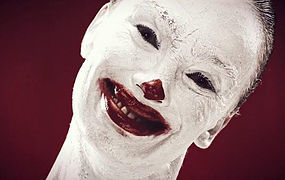 Call for submissions
Call for submissionsOWP was created to publish anthologies and one or two novels a year. So far, we have two novels we are working to publish, as well as two anthologies. I want to provide readers with stories that entertain, and at the same time say something about society and the human condition. I also want to support first-time Australian authors, and authors who live to write, and write to live.
One anthology is The Body Horror Book, another project of mine, that will feature 26 chapters on body horror from a theoretical, non-fiction point of view. I studied negation at university and like to think of myself as particularly persuasive, so authors include Greg Chapman, Kaaron Warren, Brian Craddock, Gary Kemble, Wolf Creek 2 director Aaron Sterns, and many other fantastic people. I’ve also wrangled award-winning ‘Deltora Quest’ illustrator Marc McBride, who will be contributing artwork next year. So far, The Body Horror Book is the main anthology of OWP, however the other anthology will be ‘Monsters Among Us,’ a collection of fiction from several established and up-and-coming horror writers. I’ve been thrilled and perplexed by the support I’ve received about the anthology. We’ve hit 70 submissions, with still a month to go!

I’ll also be publishing my debut novel, ‘Only The Dead.’ Obviously, one of the questions I’ve been asked is whether OWP is a vanity publisher. We’re not. My novel was accepted by a traditional publisher, it was professionally edited for two years, then one day I stopped hearing from them. I waited for months and months, and after unanswered emails and phone calls, I checked the website and saw the company had closed without warning. I felt like all of my hard work had been for nothing. I was outraged. How dare they lull me with a false sense of hope? I received no explanation about what had happened, or what would happen to my contract. Nothing. I decided to self-publish. However, over time I realised this had happened to many more people, and I wondered how I could help them while also helping myself. Thus, OWP was born. Destruction is a form of creation, after all.
I named it Oscillate Wildly Press after my obsession with The Smiths. The song is an instrumental piece from their album ‘Louder Than Bombs.’ Morrissey supplied the title, a pun on his enigmatic hero, Oscar Wilde. In an interview, Johnny Marr said, “we did it really quickly in just one evening, but it came together beautifully.” We’ll be publishing both fiction and non-fiction in the genres of horror, mystery, science fiction, historical fiction, and the plain weird. I don’t know what ‘plain weird’ is supposed to signify. My face?! There are nine people on the OWP team, all with combined experiences in writing, illustrating, and publishing. Many are people I’ve worked with before, which was rather comforting. I know who they are, their philosophy, what ideas. We are not strangers to each other, and we all want the same thing. I’ve run into a bit of opposition. A few people have shamed me (on the internet), condemned me, suggested my intentions are impure, secretive, that I am not who I say I am, that my years as a journalist and my bachelor degree is not enough experience. These people are all editors of other small publishers, and while at first their words were hurtful, it made me stronger and determined to succeed. It was never my intention to appear unseemly, deceptive, or misleading. Human beings gain nothing by acting in such a manner. What is the point of defaming someone’s character for the purpose of spite? All it does it suggest ignorance and aggression. The Cosmological Argument goes like this: Everything that had a beginning had a cause. The Universe had a beginning. Therefore, the Universe has a cause. Why strip away someone’s cause, the beginning of something new? Some people are just idiots. I will not apologise for my humanity, fools!
I don’t know what will happen in the future, or if OWP will be successful. We have acquired a novel by American author C.E. Robertson, which will most likely be published at the end of the year (hopefully December). What I do know is that I will publish anthologies of the highest standard, with award-winning cover artists, and will provide titles that will engage, thrill, and excite readers. I just need to finish my own damn novel! Eventually.
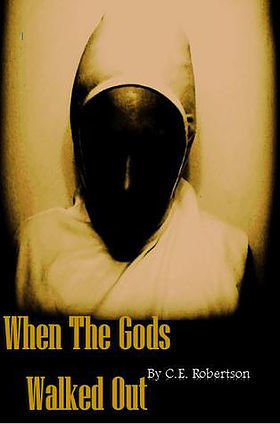
Many thanks to Claire - I'm very happy to say that my work will be in the Body Horror Book! As I have written a chapter on skin...
September 30, 2016
Shadows of the Oak cover reveal
 Cover art by Līga Kļaviņa, cover design by Ken DawsonShadows of the Oak explores the role of the anti-hero in this illustrated collection of original fairytales from thirteen talented authors, to be released in November 2016 as a stunning hardback.
Cover art by Līga Kļaviņa, cover design by Ken DawsonShadows of the Oak explores the role of the anti-hero in this illustrated collection of original fairytales from thirteen talented authors, to be released in November 2016 as a stunning hardback.
September 28, 2016
Book Deal & Appearances
Yesterday’s news I’ve been sitting on for a while was announced – I’ve signed a book deal with Kristell Ink for my novel Seven Deadly Swords – which I’m now editing. I very happy to sign to them as they’re a great publisher.
October is always a busy time for me with HorrorCon, Bristol Festival of Literature and BristolCon all in the same month. And this year looks especially busy! Ah well I can sleep in November right?
I’ll be doing a reading on Sunday 2nd October at the Sunday Assembly
I’ll have a blog post on the HWA Halloween blog (link when I have it):
4-Oct
Do People Still Bob for Apples?
I’ll be running the book panel and the readings at Bristol HorrorCon
I’ll be doing a reading on 18th October at Unsung Stories
The North Bristol Writers are doing a special event at Arnos Vale Cemetary as part of Bristol Festival of Literature on the 20th October and we’ll be entering a team into the Flash Slam on the 21st October. I’ll also be at quite a few of the festival’s other events. There’s a great line-up this year so do check it out and sign up.
I’ll also be at BristolCon again this year on October 29th:
Moderating a panel at 13:00:
Uncanny Valleys of the Mind – When does software becomes intelligent? When does an artificial intelligence qualify as a sentient being?
We’ve been worried about sentient robots for a long time, but are we really worrying about what they might do to us, or what they might do to our understanding of ourselves? When we’re developing smart machines, how do we weigh up the benefits and the dangers, and given that a Twitter chatbot can become a fascist in 24 hours, when do we pull the plug?:
Peter Sutton (M), Claire Carter, Kevlin Henney, Ken MacLeod, Rosie Oliver
Ken MacLeod!!
Appearing on a Panel at 10:00:
Call Me Rosetta – First Contact: a how(not?)-to guide – As a probe sent out from Earth, what am I looking for, and what do I send back? If there’s life out there, when we meet the aliens, how do we say hello? How can we explain ourselves, and what should we keep back until the second date?:
Ian Millsted (M), Misa Buckley, Peter Sutton, Deane Saunders-Stowe, Janet Edwards
And doing a reading (from the novel Sick City Syndrome) straight after the panel at 13:50


September 27, 2016
Savour your small victories
For the last few days I've been up North at that there FantasyCon and had a splendid time.
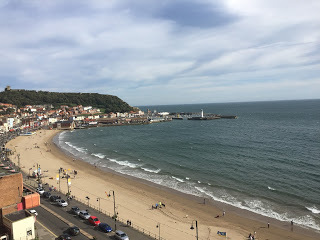
Scarborough

The Grand Hotel (from the beach) -
I was in Room 00001 deep, deep in the bowels of the hotel - the last window on the left, at the bottom - there would have been a nice view of the beach if the window wasn't so encrusted with filth... the food at the hotel was, er, interesting and the clientele odder than the con-goers (including Brexit man and man telling anti-American jokes) and boy was the Royal Ballroom swampy! But they got the basics right (for me) and I have stayed in worse places!

The Grand Lobby
There were books (including mine)
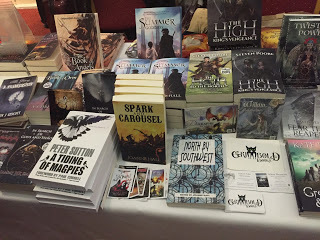
The Grimbold book table
There were readings (including mine - for which there is no photographic evidence)
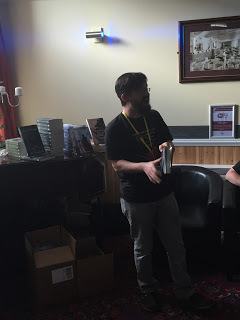
BFS award nominee Steven MPoore
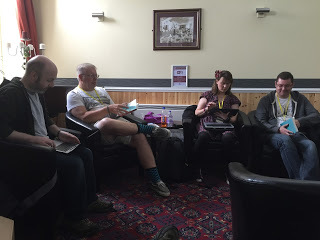
The Glasgow SF Writers group
There were panels. Including mine which was a fun one, ably moderated by Alasdair Stuart and which ranged over a wide array of superhero related topics. It was very early in the morning, which is what saved me Friday night - I'd visited a few things with free alcohol but managed to get to bed at a reasonable time so was relatively OK on Saturday...
There were awards
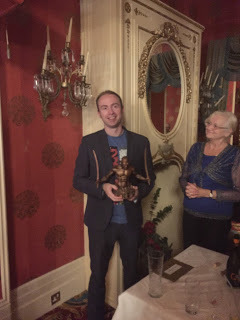
Gemmel Award winner Pete Newman
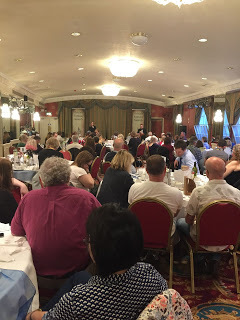 The (very hot) BFS Awards
The (very hot) BFS AwardsCongratulations to all the Gemmell and BFS award winners!
There was karaoke (no photos or videos to spare the guilty)
And, of course, there were many, many conversations in the bar.
One such conversation, far too late on Sunday evening, fuelled by alcohol and quite maudlin, has prompted the title of this post. A few fellow authors - two English, on Italian, one Polish, one Maltese, one Scottish and one who lived in Sweden, sat discussing everything from ancient Egyptian mythology to the Black death to antibiotic-resistant bacteria to exoplanets to Easter Island to, oh many other things, you get the idea. Authors being the modern polymaths, interested in everything really do have the most fascinating conversations.
One conversation we had though, or a sub-conversation, was about why we put ourselves through being writers. Pouring heart and soul into a piece of work only for it to get rejected by all and sundry. To spend literally years writing a book and then struggle to get it published, then struggle to market it then struggle with reviews when it's finally published. Not everyone can win awards, or be nominated for them or even get a publishing deal with the big publishers. And that's why we should celebrate the small victories, and savour them as much as possible. It was fantastic to see friends nominated for awards, and brilliant seeing friends win awards. But I'm so far away from that right now (if I'd even ever get there!) Hence the small victories.
When I got a story published in an anthology for the first time (Airship Shape) I saw that as the first of many, my expectation was that arrogant (thankfully, humbly, other people have subsequently liked my work enough to publish it, for which I am grateful) but another friend, also with his first published story in the same anthology said something at the launch which made me change my expectations, and my attitude. He said - "I am determined to enjoy this experience, because it may never happen again."
And so I always try (sometimes I don't succeed) to enjoy the small victories, as well as the large ones. My small victories this weekend were that I was on the program (doesn't always happen at every Con I go to), I did a reading and the audience was in double figures (better than last time I did a reading at FantasyCon), I sold two books (not a massive amount - but better than not selling any books) and I got to meet and talk to an amazing bunch of industry folk. Some I knew already (including two of the guests of honour), some I didn't.
Being a writer may be hard, and it may occasionally be bleak, but that really does mean that when there are moments of joy you should make the most of them. But like a drug addict you always seem to need another hit, and bigger hits too. Another story is sold? Is it to a more prestigious outlet than the last? Just signed a deal on a new book? Is it a better deal than last time, is it for a better book? etc. Don't be content, use any discontent you have as a spur - "oh they rejected that story? They won't reject the next one!" but do celebrate any victory, however small...
September 19, 2016
Updates and appearances
I’ll be at FantasyCon by the Sea
I’ll be on one panel – Saturday morning 10am – http://fantasyconbythesea.com/item/holding-out-for-a-hero/
And doing at Reading, also on Saturday, at 19:30 with Malcolm Devlin
Apart from that I’ll be doing a stint on the Kristell Ink stall in the dealers’ hall and will be skulking around various panels or in the bar.
My book – A Tiding of Magpies will be for sale on the Kristell Ink stall
My debut novel – Sick City Syndrome will hopefully be launched at Bristol HorrorCon
I’ll be running the Book Panel at HorrorCon and the Readings more info soon (as soon as FantasyCon is out of the way)
I’ll be doing a reading, at Bristol Festival of Literature where the North Bristol Writers will be telling ghost tales at Arnos Vale Cemetary (tickets £8)


September 12, 2016
Interview with Dave Hutchinson
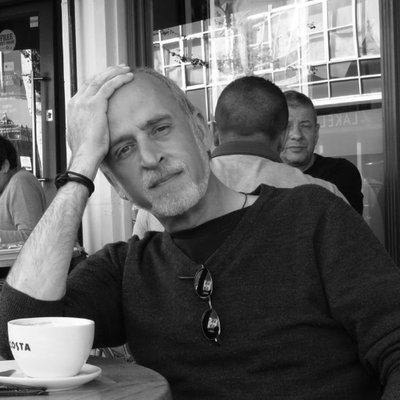
(photo by Cecilia Weightman)
Dave Hutchinson is best known as the author of the Fractured Europe series, the first two books have made the Clarke Award Shortlist. BRSBKBLOG asked him about the latest in the series - Europe in Winter coming in November 2016
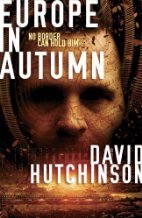
This is the 3rd in the Europe series - what's the general overview for people who aren't aware of them (as if there are still people not aware of them!) & any hints on what the third is about?
The Europe books are set in Europe – no spoilers there – between fifty and eighty years from now. Economic collapse, a flu pandemic, and reaction to a flood of refugees from the South have caused the EU to fracture into its component nations, and then to fracture further into many smaller nations and statelets, some of them stable, others short-lived. The hardening of European borders has proven an opportunity for a group calling themselves Le Coureurs des Bois, who are basically smugglers. The first book, Europe in Autumn, followed an Estonian chef named Rudi as he joins the Coureurs and then gets mixed up in a conspiracy involving a parallel Europe called the Community. The second book, Europe at Midnight, follows two intelligence officers from very different places as they become involved with a plot to derail union between the Community and Europe. And the third book, Europe in Winter, returns to Rudi, who in the middle of investigating what seems to be a massive terrorist outrage discovers that many of his assumptions about the world – and his own life – have been wrong.
Was it an especial challenge or easy to return to the world you created in the first two books?
It was really easy to go back to what a friend of mine called ‘Autumnal Europe’. I’ve had the whole thing ticking over in my head for years. If anything, it’s harder to write stuff that isn’t set in that world. It takes a real mental U-turn.
Last post I made about you was for your short story collection Sleeps with Angels (http://brsbkblog.blogspot.co.uk/2015/04/review-sleeps-with-angels-by-dave.html) do you write a lot of short stories?
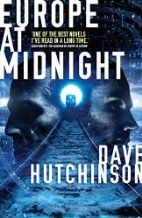
I used to write nothing but short fiction; I’d been writing for about twenty-five years before I got round to producing a novel. Actually, I think I’m really a short story writer by nature rather than a novelist. I find writing very hard work, and a novel is a huge project for me; at least with a short story it’s over quite quickly. Also, I have quite a short attention span. Having said that, there’s been a spell of five or six years now when I’ve done nothing but work on books, although I’ve recently finished a couple of short stories.
The first two books were nominated for the Clarke has being on a prestigious shortlist twice changed how you approach writing?
The nominations thing has all been a bit mad and wonderful, to be honest. Better writers than me work for years and don’t get a single nod, so the attention the Europe books have received is deeply humbling, and if I’m honest not a little baffling. But I don’t think it’s changed the way I approach writing; it’s still as chaotic as it ever was.
What are you currently working on (apart from this interview)?
I’m working on a non-Europe novel. I’m not sure I should say very much about that, for various reasons, until the publishers make an announcement about it. But it’s very different.
If you could be a character in the series who would it be and why?
Which character would I be? That’s a hard one. Rudi’s the little voice in my head, the sort of person I’d quite like to be, so I’d have to say Rudi.
How much planning and research do you do before a novel?
I don’t tend to plan a lot, but I do usually have some bits and pieces of dialogue and action and a vague idea what’s going to happen. With Winter, I had the beginning and end and a sort of feeling about some stuff in the middle. Mostly I just keep writing and fit it together as I go along. I do a bit of research before starting a book or a story – although quite often that ends up being thrown away because it becomes irrelevant as the story develops. Most of the research takes place while the book’s being written, as and when it’s needed.
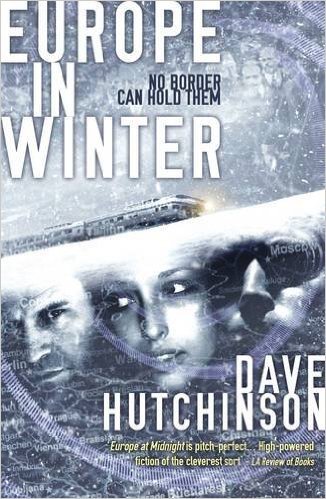
Why's your website called "automatic cat"? - https://hutchinsondave.wordpress.com/
I honestly can’t remember why I called the blog The Automatic Cat; it seemed like a good idea at the time, I suppose. It’s mostly just a place for opinionated and poorly-informed rants and I need to do more of it.
In one sentence what is your best piece of advice for new writers?
Advice for new writers? Just keep writing.
Thanks to Dave for the answers - go check out his books, there's a very good reason they keep being nominated for prizes - they are very good!
We're lucky enough to have been sent an ARC for Europe in Winter so expect a review 'soon' (for a given value of soon)
August 26, 2016
some reviews - House of Shattered Wings, Cinema Alchemist & Under the Skin
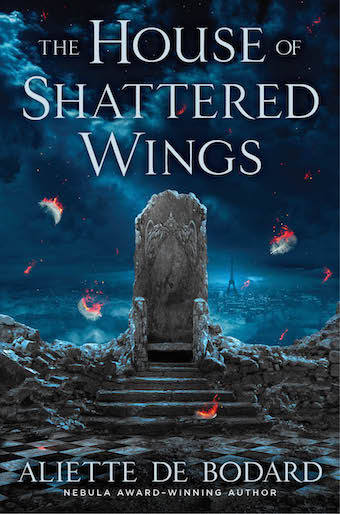
Aliette de Bodard - The House of Shattered Wings
Paris has been devastated in a great war between rival houses. Fallen angels are the source of magic in the city and they scrabble around in the ruins vying for domninon. Mortals and immortals all chasing the last wisps of magic in a corrupted world. This book mainly revolves around the story of Silverspires, one of the great houses, formerly the greatest with Morningstar himself as its head. As we follow a cast of characters, as flawed and broken as the city they inhabit.
There is a murder mystery conceit but that just serves as a vehicle for intense character exploration. Mainly of the mysterious Vietnamese Philippe and the ingenue Isabelle, newly fallen and tied to Philippe though his imbibing of her blood (since fallen are the source of magic, people tend to harvest them). There are a host of interesting minor characters, although at the beginnign I was mixing some of the minor, less fleshed out characters up.
There's a lot here to like - the grand houses, the magical system, strong imagery and character. I would have liked to have seen more of post-fall Paris (a city I know quite well through many visits) but it's a world that Bodard will obviously return to. And some of it needs to be returned to I feel, I'd like to explore the under the Seine kingdom more and see inside the other houses so I will definitely return to the world once she writes more.
Overall - Enjoyable aftermath tale featuring fallen angels battling for Paris
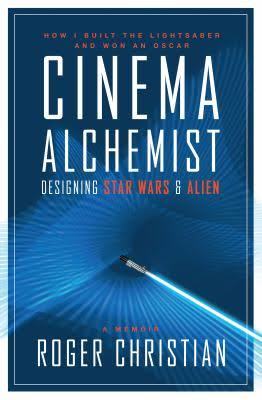
Roger Christian - Cinema Alchemist
Roger Christian is the legendary set designer for Star Wars and Alien and if that in itself doesn't make you want to pick up this book where he tells all about his experiences working on those films then I'm not sure what will.
The iconic nature of the films is such that any insight into how they were made is welcome. But especially the art department's role in creating some of the most recognisable characters - including of course R2D2 & C3PO.
Christian has obviously polished some of the anecdotes that appear in this book and it is a delight to see the films through his eyes, as well as the directors, actors and other crew. Tales of regular ten hour drives back and forth through the desert during low-tech days without mobile phones seem like a different world (the past is a different country after all)
If I had any criticism, and this is only very minor as I hugely enjoyed the book, Christian has the tendency to repeat himself - for example telling you there was a Roman road to Tozeur and then a few pages later telling you the drive to Rozeur is down a straight Roman road or the description of the Chinese restaurant is repeated a page later, or saying that there were no cellphones on page 124 and then repeating it on page 125. It happened so often that it was a little distracting once I'd noticed it and I think a good copy-editor could have picked up on that and smoothed it out for the reader. But, as I say, a minor criticism.
I enjoyed the Alien chapters more than Star Wars, but mostly because I'm a bigger fan of Alien than Star Wars (Geek friends don't hate me!) It was also interesting to read about his own directorial work on his own film Black Angel and his stint on Life of Brian (which re-used a lot of the same locations as Star Wars as any good fan knows)
There are a set of nice photographs of Star Wars and a storyboard of Black Angel but I wondered why there were no pictures of Alien.
Overall - This is an excellent book to add to the shelf if you are a Star Wars or Alien fan or any sort of film buff.

Michael Faber - Under the skin
This was recently made into a film (a major motion picture in the jargon of the industry) starring Scarlett Johanssen which I haven't seen. It is the story of Isserley, a female driver who cruises the Scottish Highlands picking up hitchhikers. I'm not sure it's much of a spoiler to say - she's an alien - but Faber seems to think so as he doesn't explicitly reveal that fact for a third of the book, although it's obvious from very early on. For some reason that conceit is a little irritating - it's a bit like watching a zombie movie where no-one is saying the z-word.
The glimpses into the POV of her victims is fairly repetitive, apparently all men can think of are tits - but then again that is her main feature, as Faber continuously tells us.
On a sentence by sentence level this is good writing. It just failed to engage me overly much, although I read it in just a couple of days of easy reading. And in the end it left me a little cold and unchanged. But I do want to watch the film to see how it has been adapted.
Overall - It may just be a very long advert for vegetarianism
August 11, 2016
Interview with Aliette de Bodard
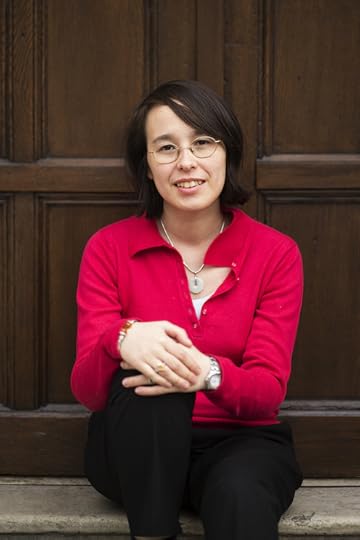
Aliette de Bodard writes speculative fiction: her short stories have garnered her two Nebula Awards, a Locus Award and a British Science Fiction Association Award. She is the author of The House of Shattered Wings, a novel set in a turn-of-the-century Paris devastated by a magical war, which won the 2015 British Science Fiction Association Award. She lives in Paris.
Aliette has dropped in to talk about her book - The House of Shattered Wings
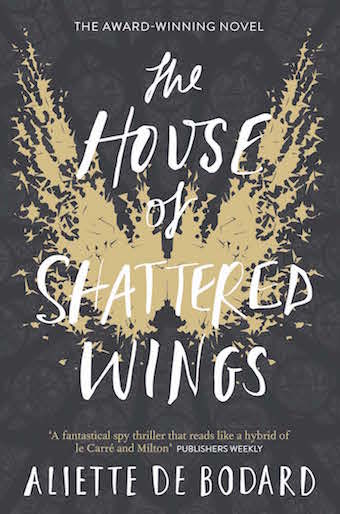
Tell us a little about the book - why is it called the House of Shattered Wings?
The House of Shattered Wings is a dark Gothic fantasy set in a decayed and dangerous Paris: in the wake of a devastating magical war, factions are fighting in the ruins of the city for power and influence. House Silverspires, once the first and foremost of these factions, finds itself in a precarious position when a newly-arrived youth from Annam (Vietnam) inadvertently unleashes a curse within its walls.
It's called that because I brainstormed the title on twitter :) More seriously, the various magical factions are "Houses" because they're geographical units that control a set of streets, but also hierarchical ones that function like quasi-feudal, enormous households. And "shattered wings" refers to a major feature of this universe, which is that amnesiac Fallen angels arrive in the city (and all over Europe), and are the source of the dominant magic: both innate magic-users, and a source of a power that can be passed on to others and/or harvested from their dead bodies...
And it's got Lucifer Morningstar sitting on a throne in the ruins of Notre-Dame. If that doesn't convince you to read the book I don't know what will!
What was it about Paris that made you want to set a novel in the city?
Well, I live there :) It was very much a case of "write what you know", or at any rate what is close to hand. I originally set out to write an urban fantasy about families of magicians fighting for influence in Paris--except that my writer brain could never muster any enthusiasm for it. Then I decided I needed a setting that was a little more overtly fantastical, and I decided that destroying the entire city in a magical conflagration sounded about right--I could have a hint of the familiar but also the freedom to make up arresting visuals and an entirely different universe (I swear I don't have a grudge against the city, lol. I just wanted a particular vibe to go with the book, and I've always had a weakness for Gothic).
Did you do any specific research for the book - was it difficult to stop researching?
I did a lot of research into places, mostly: monuments of Ile de la Cité and their history (trying to find out if there was a crypt in Notre-Dame, for instance, was rather more involved than I thought, since I was on bedrest for health reasons at that time), and also into the history of 19th Century Paris and 19th Century Vietnam, since that was the period vibe I wanted to give to the book. I didn't have trouble stopping to research: what I usually do is stock up on research until I can get a plot to coalesce together. When that happens I usually put away the research books and only dip into them for the occasional detail.
If you could be one of the characters in the book who would it be and why?
Uh, I don't really think I would like to be anyone in the book, because so many unpleasant things happen to them (it's my job as the author *grin*). But if I had to pick someone I'd be Claire, the head of House Lazarus: she's this old woman who people keep underestimating--running one of the weakest magical factions in Paris, and getting away with it by sowing dissensions among the other factions. I'm not saying I like what she's doing, but she's certainly one of the characters who excels at getting what she wants!
Do you write a lot of short stories?
I've lost count! I started writing short stories because I thought they'd be easier to get critiques on than a novel (I now know that was a really bad idea, in the sense that while there are common points, knowing how to write a good short story doesn't mean you know how to write a novel). I wrote a lot of.. middling ones before I came to a realisation in 2012--which was that, as uncomfortable as it was, I should focus on things that mattered to me and that touched on my personal history and culture. I ended up writing "Scattered Along the River of Heaven" (http://clarkesworldmagazine.com/de_bodard_01_12/), a story that focused on wars, diaspora and forgiveness, and was rather surprised to see it well-received--and I haven't looked back since.
Do you prefer the short or the long form & why?
I like both, but they're very different beasts! Short fiction is great for mood pieces, for experimenting with structure and unusual voices (all right, I confess to a liking for present person second tense, a POV I'd never try to write an entire novel in), and novels are good for tackling complex themes, complex plots, and for a deeper form of reader immersion. It's easier for a universe to feel lived in in a novel, I feel, because there's more space to show details, texture, and all the things I usually ruthlessly have to cut out of short fiction.
How do you decide what is a short story idea and what is a novel idea?
Mostly it's a question of depth? Not of the world as I've become rather good at highlighting only the pieces of the world that the plot is interested in: in my Xuya universe stories (they're short stories set in a recurring Vietnamese galactic empire), I don't have too much trouble throwing the spotlight on one feature or another and still keeping the result short. But rather it's plot and characters: in a short story I have a fairly simple plot, and a limited number of characters who aren't spear-carriers; in a novel there's more scope for several entwined stories, longer timeframes, complicated plots... The House of Shattered Wings, for instance, has three main characters, the Vietnamese youth, an alchemist addicted to a lethal drug, and the head of House Silverspires, who's desperately trying to safeguard her faction from the curse; and I had a lot of space for delving into these characters--what made them tick, how their past got them where they are, and also how best to use the plot to put them into uncomfortable places (my way of writing tends to be "how can I make this character's life miserable", accompanied by "what could go horribly wrong here?").
What are you most proud of in the book?
Having written it at all I think! I hadn't written a novel in five years, and I started seriously working on this one while I was pregnant: it moved in fits and starts because I had to juggle fatigue, health issues, and later a newborn. I was convinced I would never finish it, and the process was extremely draining. But I hung on because I've always been stubborn (and my agent was kind enough to send encouragement as I was making my way through it).
You have lots of recipe links on your web page - is food important to your writing? If so how?
I love food! I'm a foodie (I love to eat well, I love to cook for myself and especially for friends and family, and I'm always on the lookout for new experiences I can try to improve my cooking). And because food is important to me, I feel like it should be important in my worlds as well. If you think about it, how we prepare and eat a meal packs up so much meaning: what kind of staple food and how it gets there (agriculture, commerce), how it is prepared, in what company and what conditions (families, social hierarchies, implements and sources of heat available), how it is eaten (communally, in individual meals, how restaurants and cafés and inns differ from home cooking, food as a sign of social standing), how food plays into memory (childhood meals) and perceptions of home, etc. In my fiction I use it deliberately as an indicator of some or all of those things: there's a scene in The House of Shattered Wings where a magical faction serves shrimp on toast, an indication that, in a devastated country, they can afford to have fresh seashell--it's not only a matter of taste, but also a statement of wealth and power, a "you do not want to mess up with us" sign!
In one sentence what is your best piece of advice for new writers?
What you feel while writing something and the quality of that something have absolutely no correlation.
Thanks to Aliette for her interesting answers - please do go check out her work here
Ive just started the book so expect a review shortlyIve
August 10, 2016
The discoverability challenge - an apology, an update
See also here and here
Well things got busy with a major project hitting the day job and getting two book deals, and bringing out a book, and writing a book, and editing a book...
But I have been reading women unknown to me after March but not enough time to do reviews sadly
I read - Dear Amy by Helen Cunningham in May (which I did manage to review)
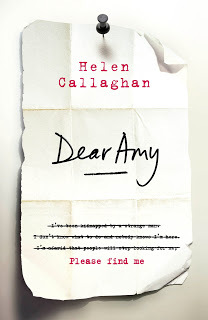
I read The Well-Tempered Sentence and The Transitive Vampire by Karen Elizabeth Gordon in June & I'll just have to owe you a review for them (they are very good basic primers on grammar)
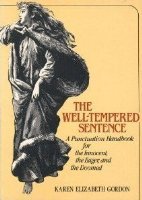
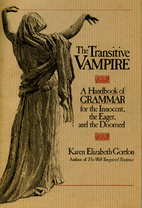
and I read The Anatomy of Prose by Marjorie Boulton in July, again review owing (an interesting book on prose forms, rhythms, and construction)
But the writing books aren't really discovering new women writers, or at least they don't feel like - and I completely missed out April...
Out of the 60 books I've read so far this year 13 have been by women and 8 by collections of authors that include women - so it does look like I'm on track to be better than last year.
I do have books that I'll get to soon for women new to me - but I think I need to prioritise them to get back on track with this challenge!
Once I've finished the ARC I'm currently reading for Titan I'll move onto The House of Shattered Wings by Aliette de Bodard - a writer known to me, but not yet read.
July 22, 2016
Dear Writer Friends - an open letter

This post was prompted from the recent NewCon birthday bash - I queued and got a book signed - but felt guilty that I didn't get other books and also get them signed. Even from people I'd consider friends, and would love to support...
Dear Writer Friends,
I'd like to support you by buying your books. By reading each and every one of them. By recommending them to others from a position of knowledge. By pressing them on friends and family and other readers as presents. I would blurb them if I was more famous (or even slightly famous). I would mention them in interviews as 'books that have influenced my writing'. Or in answer to the oft-asked question - 'what are you reading right now? What do you think we should be reading?'.
I would write long reviews on all the right websites and blogs, and in all the right magazines and papers. I would do all of this and more, if I could.
I'm sure you'd do the same for me, right? This whole book business works best if we support each other. But I'm sure that, like me, there are reasons you can't. We both know that we have our book to write, we have a commission for a short story that has a pressing deadline, we have a blog post to write to promote our own work.
That we need to watch TV as a method of procrastinating and that procrastination is very much part of our process.That we need to read books on how to write books (my personal addiction). That we need to read books about interesting subjects we may write a sentence about in our next work. That we need to read books by writers we admire greatly and wish to emulate, who are mostly dead.
We both need to prepare for interviews; or do interviews. Prepare for a panel, prepare for an article. That we are mid short story, or novellette, novella or novel. That the very thing we could use to help each other is in short supply. Our words and the time to use them.
It's very much not that we don't want to.
Today I could have helped a writer friend. Today I wrote a blog post about not having time to help writer friends .
I know you'll understand as you'll have read this knowing that you could have written the exact same letter to me.
Maybe next time you are selling a book I'll buy it and ask you to sign it.
Maybe next time...
Pete Sutton's Blog
- Pete Sutton's profile
- 14 followers



